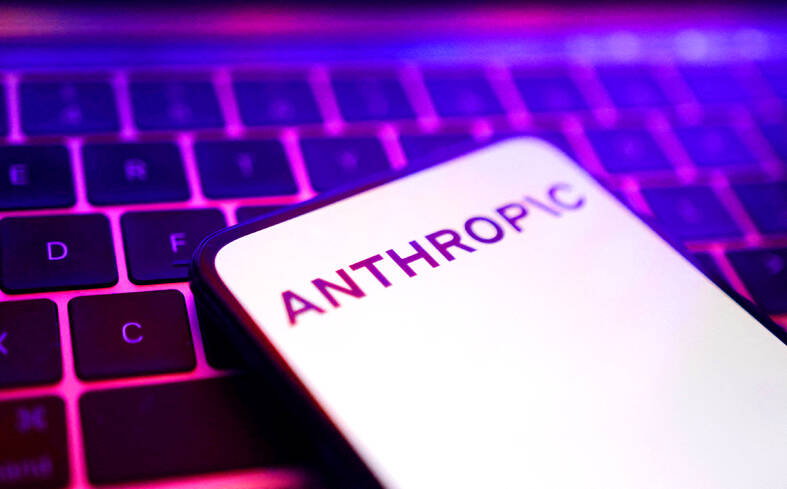Nvidia Corp and Microsoft Corp on Tuesday announced investments totaling US$15 billion in artificial intelligence (AI) start-up Anthropic PBC, creator of the Claude chatbot, amid frenzied spending on the technology and growing fears of a bubble.
AI chip powerhouse Nvidia committed up to US$10 billion, while Microsoft — which owns 27 percent of Anthropic rival OpenAI — pledged up to US$5 billion to the San Francisco-based start-up.
Microsoft also continues investing heavily in its own Copilot AI that runs on the company’s Azure platform.

Photo: Reuters
The deal was part of a sweeping agreement that saw Anthropic commit to purchasing US$30 billion in Microsoft’s cloud computing capacity and adopt the latest versions of Nvidia’s chip technology.
The joint announcements by CEOs Dario Amodei of Anthropic, Satya Nadella of Microsoft, and Jensen Huang (黃仁勳) of Nvidia came just ahead of the opening of Microsoft’s annual Ignite developer conference.
“We’re increasingly going to be customers of each other,” Nadella said in an online video announcing the deal. “We will use Anthropic models. They will use our infrastructure, and we’ll go to market together to help our customers realize the value of AI.”
The investments mark a significant realignment in the generative AI sector, where competition has intensified between ChatGPT-maker OpenAI and rivals including Anthropic, but also Google, which released its latest Gemini model on Tuesday.
Anthropic was launched in 2021 by former OpenAI staff and positions itself as prioritizing safety in AI development. Its flagship product is the Claude chatbot and family of models.
Tech industry rivals, which also include Amazon.com Inc, Meta Platforms Inc and Elon Musk’s xAI, have been pouring tens of billions of dollars into AI since the blockbuster launch of the first version of ChatGPT in late 2022.
Meanwhile, Nvidia has become a coveted source of high-performance graphics processing units (GPUs) tailored for generative AI. The company’s GPUs, originally designed for gaming systems, have become the essential building blocks of AI applications, with tech giants scrambling to secure them for their data centers and AI projects.
Sources told CNBC that the fresh investment valued Anthropic at US$350 billion, making it one of the world’s most valuable companies. OpenAI was most recently valued at US$500 billion.
The massive investment in Anthropic comes a month after Nvidia announced it would pump as much as US$100 billion into OpenAI, building infrastructure for future generations of the technology.

SEMICONDUCTORS: The German laser and plasma generator company will expand its local services as its specialized offerings support Taiwan’s semiconductor industries Trumpf SE + Co KG, a global leader in supplying laser technology and plasma generators used in chip production, is expanding its investments in Taiwan in an effort to deeply integrate into the global semiconductor supply chain in the pursuit of growth. The company, headquartered in Ditzingen, Germany, has invested significantly in a newly inaugurated regional technical center for plasma generators in Taoyuan, its latest expansion in Taiwan after being engaged in various industries for more than 25 years. The center, the first of its kind Trumpf built outside Germany, aims to serve customers from Taiwan, Japan, Southeast Asia and South Korea,

Gasoline and diesel prices at domestic fuel stations are to fall NT$0.2 per liter this week, down for a second consecutive week, CPC Corp, Taiwan (台灣中油) and Formosa Petrochemical Corp (台塑石化) announced yesterday. Effective today, gasoline prices at CPC and Formosa stations are to drop to NT$26.4, NT$27.9 and NT$29.9 per liter for 92, 95 and 98-octane unleaded gasoline respectively, the companies said in separate statements. The price of premium diesel is to fall to NT$24.8 per liter at CPC stations and NT$24.6 at Formosa pumps, they said. The price adjustments came even as international crude oil prices rose last week, as traders

Taiwan Semiconductor Manufacturing Co (TSMC, 台積電), which supplies advanced chips to Nvidia Corp and Apple Inc, yesterday reported NT$1.046 trillion (US$33.1 billion) in revenue for last quarter, driven by constantly strong demand for artificial intelligence (AI) chips, falling in the upper end of its forecast. Based on TSMC’s financial guidance, revenue would expand about 22 percent sequentially to the range from US$32.2 billion to US$33.4 billion during the final quarter of 2024, it told investors in October last year. Last year in total, revenue jumped 31.61 percent to NT$3.81 trillion, compared with NT$2.89 trillion generated in the year before, according to

PRECEDENTED TIMES: In news that surely does not shock, AI and tech exports drove a banner for exports last year as Taiwan’s economic growth experienced a flood tide Taiwan’s exports delivered a blockbuster finish to last year with last month’s shipments rising at the second-highest pace on record as demand for artificial intelligence (AI) hardware and advanced computing remained strong, the Ministry of Finance said yesterday. Exports surged 43.4 percent from a year earlier to US$62.48 billion last month, extending growth to 26 consecutive months. Imports climbed 14.9 percent to US$43.04 billion, the second-highest monthly level historically, resulting in a trade surplus of US$19.43 billion — more than double that of the year before. Department of Statistics Director-General Beatrice Tsai (蔡美娜) described the performance as “surprisingly outstanding,” forecasting export growth